The White Man’s Here. Who Needs Some Assimilation?
 When Gran Torino comes out on DVD in June, you all owe it to yourselves to see it (if you haven’t already). Not because it’s a great movie, but rather because it’s made from a perspective so antiquated that it’s no surprise that it was Clint Eastwood’s biggest hit in years. Granted, Clint is old and while he spent the last 20 years of his career apologizing for the previous 30, just because you have good intentions, doesn’t prevent you from being a condescending dolt.
When Gran Torino comes out on DVD in June, you all owe it to yourselves to see it (if you haven’t already). Not because it’s a great movie, but rather because it’s made from a perspective so antiquated that it’s no surprise that it was Clint Eastwood’s biggest hit in years. Granted, Clint is old and while he spent the last 20 years of his career apologizing for the previous 30, just because you have good intentions, doesn’t prevent you from being a condescending dolt.
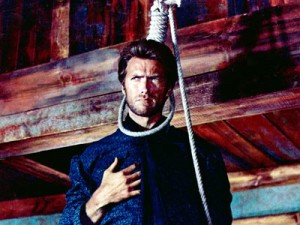 Looking back on his early films, like the Dirty Harry movies and the nihilistic westerns he directed himself (but not the Sergio Leone Dollars trilogy) such as Pale Rider, High Plains Drifter and The Outlaw Josey Wales, it seems more than a bit disingenuous for him to make one film after another that repudiates the messages of the movies that made him popular, like he’s above the audience he wanted to please. This is perfectly exemplified in films like Unforgiven, Million Dollar Baby, and A Perfect World, all about the evils of enjoyable violence, and how, though we must go into battle on occasion, we must do so with a heavy heart and with respect for our enemies. Just like how the hippies of the 60’s turned into conservative people who hate the poor, those they were initially rebelling against (which is exactly what Eastwood’s characters were), the racist, homophobic, misogynist, close-minded, and uninterested in what you have to say crowd, have become solemn, believing they have to atone for their sins by giving us didactic messages that they’ve learned during their salad days. This attitude would be fine if the messages being sent weren’t completely bogus, attempting to pave over their hateful past with clichéd ideas and pandering moral “truths.” It is not a coincidence that Eastwood has recently worked rather frequently with Paul Haggis*, who is also the writer/director of the “aren’t we all conveniently racist?” Oscar winning Crash.
Looking back on his early films, like the Dirty Harry movies and the nihilistic westerns he directed himself (but not the Sergio Leone Dollars trilogy) such as Pale Rider, High Plains Drifter and The Outlaw Josey Wales, it seems more than a bit disingenuous for him to make one film after another that repudiates the messages of the movies that made him popular, like he’s above the audience he wanted to please. This is perfectly exemplified in films like Unforgiven, Million Dollar Baby, and A Perfect World, all about the evils of enjoyable violence, and how, though we must go into battle on occasion, we must do so with a heavy heart and with respect for our enemies. Just like how the hippies of the 60’s turned into conservative people who hate the poor, those they were initially rebelling against (which is exactly what Eastwood’s characters were), the racist, homophobic, misogynist, close-minded, and uninterested in what you have to say crowd, have become solemn, believing they have to atone for their sins by giving us didactic messages that they’ve learned during their salad days. This attitude would be fine if the messages being sent weren’t completely bogus, attempting to pave over their hateful past with clichéd ideas and pandering moral “truths.” It is not a coincidence that Eastwood has recently worked rather frequently with Paul Haggis*, who is also the writer/director of the “aren’t we all conveniently racist?” Oscar winning Crash.
 Gran Torino plays with race baiting in the same way as Crash does, throwing out epithets whenever the point needs to be made that Eastwood’s character, Walt, is an old codger in need of redemption. Clint’s attempt to turn Walt into a inadvertently comedic figure and simultaneously someone who knows how the world works, is a tonal disaster. The TV ad that featured the “Get off my lawn!” scene? Somehow, not a joke. Clint’s constant growling with disapproval at the youngins and their Asian ways? That’s a joke. The fact that grizzled war veteran carries what appears to be an “officer of the law” Dirty Harry-type gun in a holster, despite being a bitter old man who drives an ancient white pick-up truck, not a joke. Neither is the idea of this terribly unpleasant man teaching the wayward Hmong next door a thing or two about white life and how to live with honor and avoid being a gang member. One could make the point that the acting by the Hmong actors in the film, which is stiffer than a nerd with an Asian fetish at a 24 hour hentai marathon, is more realistic, and they are more natural. But then why have them give speeches or scenes where they have to cry? These are all clearly forced and it really reveals the limitations of Clint’s conception.
Gran Torino plays with race baiting in the same way as Crash does, throwing out epithets whenever the point needs to be made that Eastwood’s character, Walt, is an old codger in need of redemption. Clint’s attempt to turn Walt into a inadvertently comedic figure and simultaneously someone who knows how the world works, is a tonal disaster. The TV ad that featured the “Get off my lawn!” scene? Somehow, not a joke. Clint’s constant growling with disapproval at the youngins and their Asian ways? That’s a joke. The fact that grizzled war veteran carries what appears to be an “officer of the law” Dirty Harry-type gun in a holster, despite being a bitter old man who drives an ancient white pick-up truck, not a joke. Neither is the idea of this terribly unpleasant man teaching the wayward Hmong next door a thing or two about white life and how to live with honor and avoid being a gang member. One could make the point that the acting by the Hmong actors in the film, which is stiffer than a nerd with an Asian fetish at a 24 hour hentai marathon, is more realistic, and they are more natural. But then why have them give speeches or scenes where they have to cry? These are all clearly forced and it really reveals the limitations of Clint’s conception.
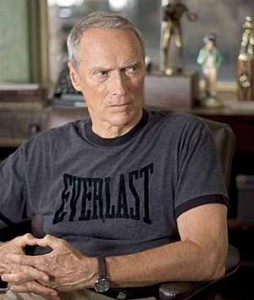 But what, exactly, is the agenda of Gran Torino? From a distance, it appears to be the strangest white savior movie ever made. The movie works like any insecure white man thinking that Asian women can be controlled, reinforcing the heavy tendency towards a patriarchy in Asian countries. Since Gran Torino is very much about saving immigrants from their own behavior, under the aegis of a pure (white), stern (strong-willed) heterosexual (masculine). In other words, he’s trying to teach them how to be real men, and just as importantly, for female characters to stay within their societal limits. It is no coincidence that the only woman who asserts her individuality is raped, and then has to be defended by the great white hope. And while those foreigners suffer, our Caucasian friend is here to be the hero/martyr. And our hero gets all the character traits, dialogue, and is the only one to properly exhibit his righteous anger while redeeming his past misdeeds.
But what, exactly, is the agenda of Gran Torino? From a distance, it appears to be the strangest white savior movie ever made. The movie works like any insecure white man thinking that Asian women can be controlled, reinforcing the heavy tendency towards a patriarchy in Asian countries. Since Gran Torino is very much about saving immigrants from their own behavior, under the aegis of a pure (white), stern (strong-willed) heterosexual (masculine). In other words, he’s trying to teach them how to be real men, and just as importantly, for female characters to stay within their societal limits. It is no coincidence that the only woman who asserts her individuality is raped, and then has to be defended by the great white hope. And while those foreigners suffer, our Caucasian friend is here to be the hero/martyr. And our hero gets all the character traits, dialogue, and is the only one to properly exhibit his righteous anger while redeeming his past misdeeds.
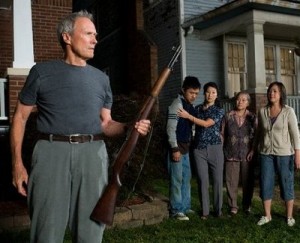 All white savior movies are about the character’s redemption. Rather than be about the one dimensional immigrant/foreigner/minority who is being held back/beaten up/prejudiced against, it is about the drunk/disgraced/hateful white protagonist who learns to find the true meaning of life through the suffering of the “other.” The victim character then praises the white male for being a hero and for saving his poor, simplistic life. In Gran Torino it is even more sanctimonious by making Clint the Jesus martyr on top of that (not to mention the jingoism involved in worshiping such a quintessentially American product like the Gran Torino). The underlying goal of every white savior movie is to force the minority to assimilate through the actions of the white protagonist (*spoiler* The car inheritance is not just an emotional manipulation *spoiler over*), and their very real problems disintegrate and are solved by the white people**. The culture of these foreigners is always developed condescendingly, and only as a plot point, instead of where it should be if the movie is going to be honest, front and center. Most amusing is that in a neighborhood filled with minorities, the story is told from the only white guy’s perspective, and the Asian family is just a backdrop. There’s even the amusing hypocrisy in the fact that Clint opens up and becomes less of a racist, but uses his American standards and values to stand up to the threatening gang. This behavior, of course, causes him to be lionized and turned to folklore by the townsfolk, who should have no real connection to his character.
All white savior movies are about the character’s redemption. Rather than be about the one dimensional immigrant/foreigner/minority who is being held back/beaten up/prejudiced against, it is about the drunk/disgraced/hateful white protagonist who learns to find the true meaning of life through the suffering of the “other.” The victim character then praises the white male for being a hero and for saving his poor, simplistic life. In Gran Torino it is even more sanctimonious by making Clint the Jesus martyr on top of that (not to mention the jingoism involved in worshiping such a quintessentially American product like the Gran Torino). The underlying goal of every white savior movie is to force the minority to assimilate through the actions of the white protagonist (*spoiler* The car inheritance is not just an emotional manipulation *spoiler over*), and their very real problems disintegrate and are solved by the white people**. The culture of these foreigners is always developed condescendingly, and only as a plot point, instead of where it should be if the movie is going to be honest, front and center. Most amusing is that in a neighborhood filled with minorities, the story is told from the only white guy’s perspective, and the Asian family is just a backdrop. There’s even the amusing hypocrisy in the fact that Clint opens up and becomes less of a racist, but uses his American standards and values to stand up to the threatening gang. This behavior, of course, causes him to be lionized and turned to folklore by the townsfolk, who should have no real connection to his character.
*spoiler*It is not an accident that as soon as Clint starts to learn about his new foreign friends, he is killed. He represents what they are trying to move on from, an old way of thinking, but they can’t escape it. The treatment of Clint’s character like a hero both before and especially after his death would be like putting a statue of FDR in a Japanese neighborhood. *spoiler over*
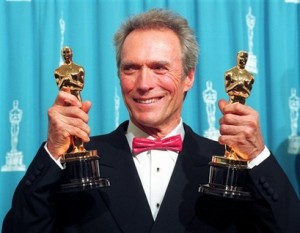 And how does the emotional manipulation of Gran Torino fit into Clint’s oeuvre as a whole? Is it really different from the obviousness of the groan-inducing Mystic River? Now, as a critic, I’m not supposed to endorse wanton, meaningless violence, especially as Clint’s moral turnaround has resulted in his more sensitive, acclaimed films (such as his unexpectedly terrific adaptation of The Bridges of Madison County), and the critically panned sequels to Dirty Harry really are pretty bad (and boring). But at least they’re relatively honest.
And how does the emotional manipulation of Gran Torino fit into Clint’s oeuvre as a whole? Is it really different from the obviousness of the groan-inducing Mystic River? Now, as a critic, I’m not supposed to endorse wanton, meaningless violence, especially as Clint’s moral turnaround has resulted in his more sensitive, acclaimed films (such as his unexpectedly terrific adaptation of The Bridges of Madison County), and the critically panned sequels to Dirty Harry really are pretty bad (and boring). But at least they’re relatively honest.
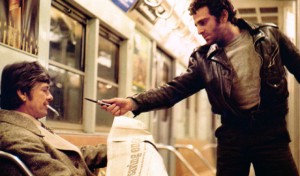 Think of the honest fascism of a movie like Death Wish. Compare the disreputable Death Wish to the unanimously praised In the Bedroom. You’d think they weren’t remotely similar, but the only difference is that In the Bedroom, in true middlebrow Oscar-pining fashion, presents the revenge-fantasy with a New England accent and in hushed tones. Just because they added familial guilt and dramatic pauses doesn’t make it any less distasteful. Sure there’s the difference in delivery, but if In the Bedroom were made for the Lifetime channel and Death Wish was directed by Jim Sheridan (In the Name of the Father, In America) and starred Russell Crowe, which film is suddenly more respectable?… When Eastwood’s being a hypocrite and no fun, and worse, he’s not even aware of it, is his filmic senility something to praise? Is the fact that his films are heavy handed and have no sense of irony a positive step in removing the cynicism from our culture and will, in the long run, prevent any further suburban white flight? When did Clint say he was going to retire again?
Think of the honest fascism of a movie like Death Wish. Compare the disreputable Death Wish to the unanimously praised In the Bedroom. You’d think they weren’t remotely similar, but the only difference is that In the Bedroom, in true middlebrow Oscar-pining fashion, presents the revenge-fantasy with a New England accent and in hushed tones. Just because they added familial guilt and dramatic pauses doesn’t make it any less distasteful. Sure there’s the difference in delivery, but if In the Bedroom were made for the Lifetime channel and Death Wish was directed by Jim Sheridan (In the Name of the Father, In America) and starred Russell Crowe, which film is suddenly more respectable?… When Eastwood’s being a hypocrite and no fun, and worse, he’s not even aware of it, is his filmic senility something to praise? Is the fact that his films are heavy handed and have no sense of irony a positive step in removing the cynicism from our culture and will, in the long run, prevent any further suburban white flight? When did Clint say he was going to retire again?
* Haggis’ breakthrough was as creator of the kick ass and moralize Chuck Norris vehicle, Walker, Texas Ranger. Basically, Haggis managed to swing both sides of Eastwood’s career in one TV show.
** For examples of white savior movies, see To Kill a Mockingbird, The Constant Gardner, Mississippi Burning, Ghosts of Mississippi, etc. It is probably best satirized in Six Degrees Separation, where the rich white people think that the best way to help this criminal who pegged them for what they were, is to treat him like an infamous celebrity who they got to slum with, and to ponder what he has taught them with his scam, all the while he turns into an anonymous memory. He doesn’t even have a real name.




Hollywood’s White Savior Complex says:
December 4th, 2009
10:54 pm
[…] the white man does not only save the day in sports. Regrettablesincerity.com’s The White Man’s Here. Who Needs Some Assimilation? attacks Clint Eastwood’s record […]